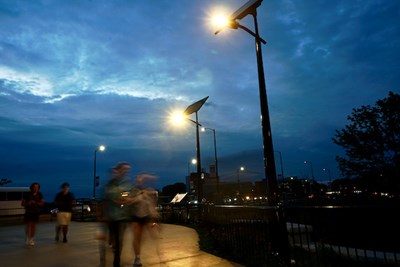GLOUCESTER, Mass. – Now is the time for North Shore communities to build on their unique strengths to build resilient, sustainable and equitable maritime economic development while also promoting and sustaining ocean ecosystem health. That is among the Phase 1 conclusions of a study led by the University of Massachusetts Amherst’s Gloucester Marine Station about the importance and impact of the Blue Economy on North Shore communities.
Thanks to a $1.95 million grant from the Air Force Office of Scientific Research, Markos Katsoulakis and Luc Rey-Bellet, both professors in the mathematics and statistics department at the University of Massachusetts Amherst, and Paul Dupuis, of Brown Uni
Animal science, economics, and legal studies are just a few of the interests of the five University of Massachusetts Amherst students selected to receive the first Abraham Bohn Scholarships for Children of Veterans.
AMHERST, Mass. – Kalpen Trivedi, the vice provost for global affairs and director of the International Programs Office at the University of Massachusetts Amherst, has been named Senior International Officer of the Year by the Institute of International Education (IIE). Trivedi was honored during a virtual ceremony today attended by Chancellor Kumble Subbaswamy and Provost John McCarthy.
EAST WAREHAM, Mass. – A $7.75 million project to expand and modernize the UMass Amherst Cranberry Station, an important research facility for the commonwealth’s cranberry industry, was celebrated today with a construction celebration event at the station in East Wareham, Mass. While the coronavirus pandemic delayed the start of construction, work is now under way on the facility with a targeted completion date of August 2022.
AMHERST, Mass. – The University of Massachusetts Amherst honored its deep roots in the performing and fine arts today at a ceremony celebrating the renaming of the Fine Arts Center building and its main stage. The building has been named the Randolph W. Bromery Center for the Arts in honor of the university’s first Black chancellor. The Bromery Center’s 1,800-seat concert hall, meanwhile, was renamed in honor of Frederick C. Tillis, a celebrated composer, poet, music educator, and arts administrator at the university, who died in 2020.

The days are getting shorter, but a busy stretch of campus is staying well-lit at night, thanks to the installation of new solar-powered streetlights.
Lawrence Madoff, MD, has received the 2021 D.A. Henderson Award for Outstanding Contributions to Public Health. Established by the Infectious Diseases Society of America in 2017, the award recognizes a lifetime of achievement in public health in honor of Dr. Henderson, who led the successful eradication of smallpox.